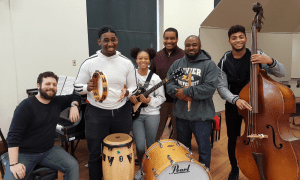Harmonizing Passion and Profession: A Journey to a Music Degree

A music degree opens a world of possibilities for aspiring musicians and music professionals. With hard work and dedication, a music degree can lead to a fulfilling and rewarding career in various fields. A music degree is not just about pursuing a passion; it’s about unlocking a world of professional opportunities in the vibrant and ever-evolving music industry.
Whether your interest lies in performance, education, production, or business, a music college degree can be the key to a fulfilling and successful career in music. Continue reading to learn about pursuing a music degree and the professional opportunities a music degree can offer, as well as the societal and professional significance of HBCU music programs.

Xavier University
The Impact of Black Artists
The contributions of Black music artists have been profound and far-reaching. They have shaped the landscape of music across many genres and countries, from jazz, blues, rock and roll, and hip-hop to R&B, soul, and more. Often influenced by the deep roots of African musical traditions, Black artists have pioneered new styles and infused existing genres with unique rhythms, harmonies, and storytelling techniques.
The impact of Black musicians extends well beyond their music, influencing social movements, fashion, and cultural attitudes worldwide. Artists like Louis Armstrong, Billie Holiday, Chuck Berry, Aretha Franklin, and Bob Marley, alongside contemporary musicians like Beyoncé, Kendrick Lamar, Robert Glasper, and many more, have broken barriers, challenged societal norms, and provided a voice for social justice, leaving an indelible mark on the global cultural fabric.
The Need for More Black Americans in the Music Industry

Xavier University
Despite their foundational contributions to the most popular genres of music, Black musicians have faced barriers to recognition and leadership positions.
The jazz era saw Black creators’ music popularized by white audiences and musicians, often without proper credit or compensation, leading to a pattern where white musicians dominate genres pioneered by Black artists.
Similarly, the commercialization process favored white artists in the country music genre despite Black Americans’ significant contributions, including introducing critical instruments like the banjo and influencing the genre’s evolution.
These historical examples highlight systemic whitewashing, tokenism, inequity, and a lack of Black representation in industry leadership, emphasizing a need for greater inclusion and equity that persists in the music industry.
For example, in 2020, the international music publisher BMG revealed that, following an extensive internal audit, royalties for Black artists under its management were up to 3.4% lower than those for their non-Black counterparts. This disparity in contractual terms for Black musicians is a longstanding issue within the music industry.
In addition, Black individuals represent less than eight percent of executives at the vice president level or higher in the music industry, according to a 2021 study conducted by the Annenberg Inclusion Initiative, which examined 4,060 executives across 119 music companies.
Professional Options With a Music Degree
Performance Careers
- Orchestra/Symphony Musician: Performing as part of a professional orchestra or symphony.
- Solo Performer: Building a career as a solo artist in genres like classical, jazz, or contemporary music.
- Studio or Session Musician: Working with a wide variety of artists who need additional performers for recording studio sessions.
Music Education
- Music Teacher: Teaching music in schools from elementary to college.
- Private Tutor: Offering private lessons for instruments or voice.
- Music Director: Leading music programs in educational institutions or community centers.
- Music Therapist: Using music to help patients recover and manage conditions.
Music Production and Technology
- Sound Engineer: Working in studios to record, mix, and master music.
- Music Producer: Overseeing music production, from the creative process to the final product.
- Audio Technician: Specializing in live sound, broadcasting, or post-production.
Music Business and Administration
- Music Manager: Managing artists’ careers, including contracts, gigs, and promotions.
- Music Marketing Specialist: Promoting music releases, concerts, and artists.
- Music Licensing Specialist: Handling the licensing of music for various uses.
Job Opportunities and Market Outlook
The job market for music professionals is expansive, with performance, education, production, and business opportunities. Music performance is an infamously competitive industry, but with new channels for finding audiences every year. With the advent of platforms like SoundCloud, YouTube, and TikTok the barriers to entry are lower than ever, while the number of musicians commanding loyal audiences continues to grow.
Non-performing music careers enjoy a stable outlook. According to the U.S. Bureau of Labor Statistics, employment of music directors and composers is projected to grow by six percent by 2029. Music educators also enjoy a promising job outlook, with many opportunities in public and private schools and instruction.
The rising popularity of digital media and technology has expanded job opportunities in music production, sound engineering, and music business, catering to the evolving landscape of the music industry. Digital media is also emerging as a powerful tool in music education, allowing for both asynchronous and remote lessons.
HBCUs Can Help You Start a Music Career
Given the recent Supreme Court ruling on affirmative action in college admissions, more Black students will likely turn to historically Black colleges and universities (HBCUs) for their education. These institutions will do everything they can to meet increased student demand. HBCUs help more students earn college degrees, compete successfully for well-paying jobs in competitive career fields, improve workforce diversity, and increase upward economic mobility.
People of all ages, races, and life paths can help improve diversity in music disciplines by supporting scholarships and other forms of funding for HBCUs with related programs. You can make a difference in the lives of music students in one easy step by making a donation today.
Want to learn more about this possible career path and college major? Have questions about which UNCF colleges and universities offer music programs? Looking for help with financing this degree?
Click Here So We Can Help You!
How to Prepare for Success
Music majors should be proficient in at least one instrument, have strong vocal abilities, or both. Hiring a private coach can be valuable in developing and honing these skills. You should also be able to read music. However, having a mix of other capabilities, like creativity, collaboration, time management, and an intuitive or theoretical grasp of musical patterns is also beneficial.
UNCF Schools to Consider
Twenty-one UNCF-member schools offer programs for students wishing to work in the field of music. Among the top ranking are:
- Clark Atlanta University
- Xavier University of Louisiana
- Spelman College
- Claflin University
- Johnson C. Smith University
- Virginia Union University
- Florida Memorial University
- Bethune-Cookman University
- Oakwood University
Professional Organizations
There are many professional organizations in various fields of music that can offer more insight into working in those fields. A sample list includes:
- American Association of Independent Music (A2IM)
- Music Business Association (Music biz)
- American Federation of Musicians (AFM)
- Americana Music Association
- American Society of Composers, Authors, and Publishers (ASCAP)
- American Music Therapy Association (AMTA)
- Music Artists Coalition (MAC)
- National Association of Record Industry Professionals (NARIP)
- National Association for Music Education (NAfME)
Scholarships Available
There’s no better way to start on your path toward a successful career in music than with a solid financial foundation. Fortunately, many scholarships are available through UNCF, including some specifically for music majors. Keep an eye on the UNCF website for current scholarship opportunities and announcements.
Search for specific scholarships and view those that are currently accepting applications here! Students should also check with each college or university to see if additional scholarships are available to study music.
As you explore your options, be sure to use our guide to applying for scholarships and grants. You can also receive guidance by submitting a major interest form if you are interested in a music career. Submit the form on our website to get started. And follow us on UNCF social media channels to receive notifications about our scholarships and member HBCUs. Reach out today!
You can also show your support for students pursuing careers and furthering equity in music by contributing to UNCF member schools. Education is the greatest tool we have in creating a just and equitable society where economic mobility is available to all. Help us achieve this future by donating today!